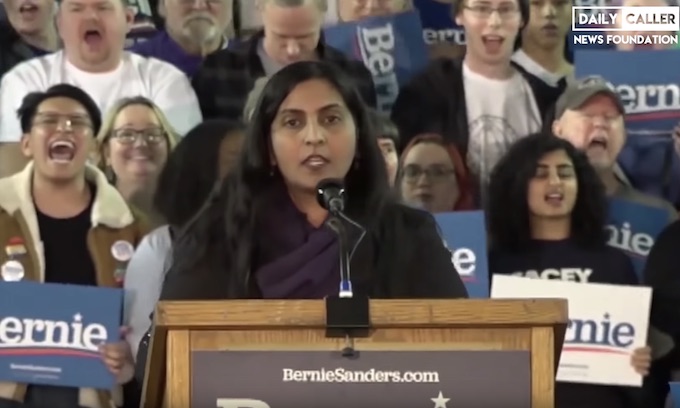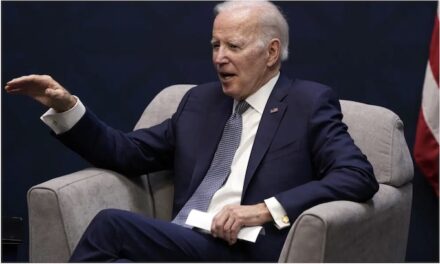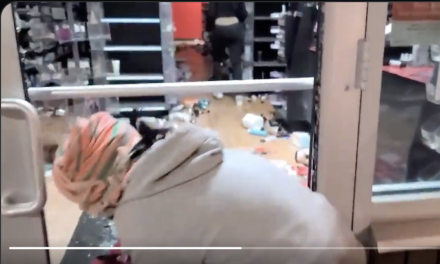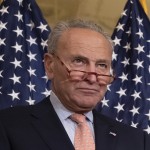When the national media came trooping through for the recent Bernie Sanders rally, they got a little jolt, Seattle-style.
“You don’t often hear introductory speakers for Bernie Sanders talking about socialism,” a Washington Post national-politics reporter noted during the rally. “But … Kshama Sawant, a socialist on the Seattle City Council, just did.”
She did more than just talk about socialism. She called for an end to capitalism, or at least parts of it.
‘We need a powerful socialist movement to end all capitalist oppression and exploitation!’ Sawant exhorted the Tacoma Dome crowd.
That’s got to be a first in recent decades: a full-throated down-with-capitalism roar at the campaign rally of a front-running American presidential candidate.
Hey America: Welcome to the Seattleization of politics.
What’s happening in the Democratic primaries may be startling the national punditry a bit and freaking out the establishment, but it should come as no surprise to anyone who has followed the evolution of politics in our remote fishing village this past decade.
Namely: The candidate farthest to the left, Sanders, is the one who is winning.
This has been a virtually ironclad rule in Seattle politics since about 2013: whoever out-lefts the field, wins. There have been exceptions — Mayor Jenny Durkan, a more traditional labor Democrat, was to the right of her opponents when she won in 2017. But for the most part we’ve seen local voters racing pell-mell to the port side faster than politicians can lurch after them.
This is now a national phenomenon among base Democratic voters, with Seattle just being an especially concentrated bellwether. Last month, Gallup, in its polling, reported “the largest degree of political polarization in any presidential year measured,” ever.
Pew Research has been tracking attitudes since 1994 about core political values (things such as whether government should be bigger or smaller), and found that voters on both sides have moved sharply away from the center. Interestingly the left base (i.e. Seattle) has veered even farther left than the right base (i.e. MAGA-world) has tilted right, according to Pew.
It’s why we may now be getting a showdown between right populist nationalism, under Donald Trump, versus left populist socialism, under Bernie Sanders. It’s a polarization smackdown.
I have no idea who would win. I once was sure there was no way Donald Trump could ever become president, so now I approach these things with a little more humility.
But my sense about Sanders and his chances comes from watching what happens to far-left ideas that, after being incubated in Seattle, are then hatched into the broader world.
Some of them — higher minimum wage, for example — have fared spectacularly well, both in conservative areas of this state and around the nation. That’s probably because higher wages are designed to lift up, not punish or tax, and are seen as a relatively low-cost path to more fairness in the world.
The ideas that crash and burn when they pass Issaquah heading east usually involve taxes. Car taxes for transit, carbon taxes for the climate, income taxes for education — they all failed in recent years outside the socialistic Seattle bubble.
So Sanders’ strength is that he’s seen as a working-class champion. But his $20 trillion in tax proposals seem like political suicide. His huge taxes on the rich have gotten the most attention, but he’s also proposed higher income taxes all the way down to the $29,000 earning level. Nobody wins a general election pledging to tax like that, even in blue Washington State (though Seattle would love it, of course!)
Then there’s how he brands himself a democratic socialist and invites real socialists like Sawant to speak for him. After the rally, the right-wing media went bananas about how “Bernie Rally Features Trotskyist Seattle Council Member Whose Party Wants to Seize Control of Banks.” That claim is actually true, as Socialist Alternative, Sawant’s party, does advocate the takeover of the top 500 corporations and banks. We may be used to this sort of crazy talk — enough to look the other way as we cash in our Microsoft or Amazon stock — but Sanders should put a hard stop to it if he wants to win in, say, the Electoral College.
As I said I don’t know who wins the coming polarization smackdown. But it sure feels like the loser already is the two-party political system, which is being pulled to the left and right so hard it’s cracking up.
___
(c)2020 The Seattle Times
Visit The Seattle Times at www.seattletimes.com
Distributed by Tribune Content Agency, LLC.
—-
This content is published through a licensing agreement with Acquire Media using its NewsEdge technology.



















Recent Comments